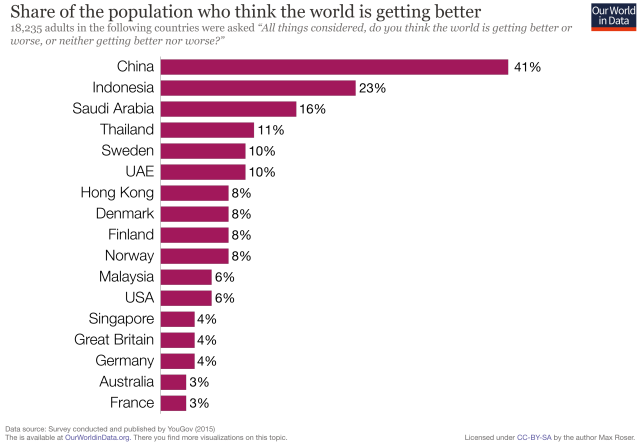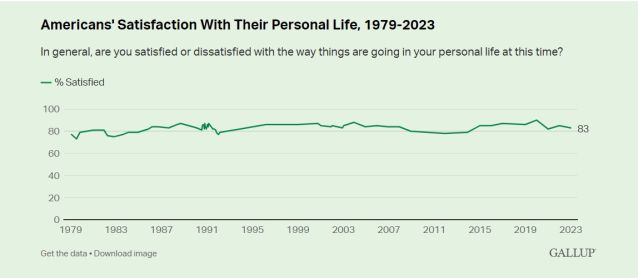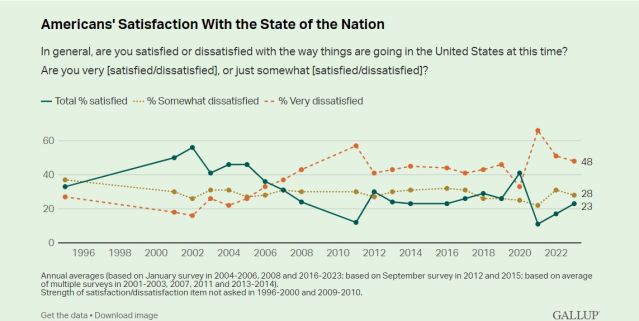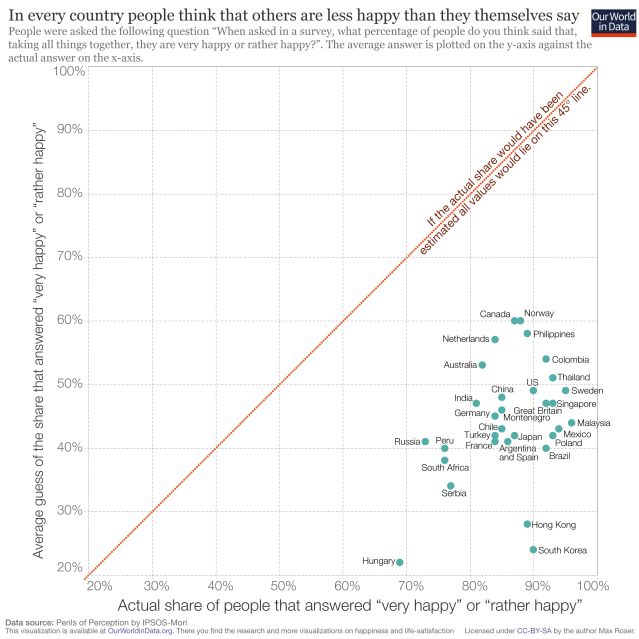Happiness
Is Our Progress Causing the World to Devolve?
Humanity has benefited from our progress, but is it our problem as well?
Updated December 14, 2023 Reviewed by Gary Drevitch
Key points
- Despite significant progress during recent centuries, humanity still struggles with thorny challenges.
- We must keep in mind that our progress is in comparison to a highly brutal history.
- People in affluent countries often report personal satisfaction but are still pessimistic about the future.
“Let me tell you why you’re here. You’re here because you know something. What you know you can’t explain, but you feel it. You’ve felt it your entire life, that there’s something wrong with the world. You don’t know what it is, but it’s there, like a splinter in your mind, driving you mad.” — Morpheus to Neo, The Matrix

Does it sometimes feel as if our whole world is going crazy? Does it seem like we are on a treadmill that keeps speeding up? We are experiencing a barrage of really thorny, unfolding challenges and problems. We have climate change, wars in Ukraine and the Middle East, rising anti-Semitism, ongoing culture wars, toxic levels of political polarization, increasing mental health problems and suicide rates, and now the promise and perils of artificial intelligence. Despite the great progress humanity has made over the centuries, it seems as if the world is devolving before our very eyes at times. Is it possible that these problems are not despite our progress, but because of it?
I have a provocative claim: I know what's going on and what we need to do about it. Does this sound bold, narcissistic, or crazy? How about this even more provocative claim: You already know what's going wrong with our world and what to do about it as well, but perhaps you don't know that you know it. Take the "red pill" and follow me and all will be made clear.
“All secrets are open secrets. Nothing is hidden. Nothing is revealed. People can only be told what they already know. Although they know, they may not be conscious of their knowledge.” — Camden Benares, Zen Without Zen Masters
A Journey of Progress and Hardship
Before we dive into what’s wrong with our world, it’s important that we all appreciate the tremendous progress humanity has made. As Harvard psychologist Steven Pinker describes in books such as The Better Angels of Our Nature and Enlightenment Now, we have made some incredible advances, beginning around the late 17th century, when the world began to see unprecedented change due to the combined effects of the Age of Enlightenment, the Industrial Revolution, and the Scientific Revolution. Most major metrics of human flourishing (e.g., longevity, poverty rates, deaths from wars, famines, pandemics, homicide) improved markedly during this time.
For instance, until a few hundred years ago, approximately 27 percent of children did not live to their first birthday, and 46 percent did not reach their 15th. As the loss of a child is the worst suffering many of us can imagine, the fact that infant and child mortality rates have dropped so significantly should be celebrated as one of the greatest collective achievements of humanity.
As another example, consider that throughout most of human civilization during the past 2,000 years, about 90 to 95 percent of humans lived in extreme poverty. Now that figure is less than 10 percent. What a remarkable triumph.
One last example of our tremendous progress includes medical and scientific advances such as germ theory, vaccines, and antibiotics which have saved the lives of countless millions. For example, during its last century of existence, smallpox killed approximately 500 million people. Those who survived this excruciatingly painful disease, which had a 30 percent infected fatality rate, were often horribly disfigured. Thanks to vaccines, no one has died from smallpox since 1979, the year that the World Health Organization declared it to be eradicated.
The History of Civilization Was Often Brutal
While Pinker emphasizes the improvements in modern times, it’s important to keep in mind that the history of civilization has often been quite brutal. Our past is filled with intense hardships such as wars, genocides, religious persecution, plagues, slavery, misogyny, oppression, inequality, and famine. Yuval Noah Harari, a historian at Hebrew University of Jerusalem, offers a broader historical perspective in his book, Sapiens: A Brief History of Humankind, arguing that the journey from our hunter-gatherer ancestors to modernity has often been a bumpy road.
It is debatable whether early modern civilization—say, up until about 200 years ago—represented an improvement over the typical living conditions of our hunter-gatherer ancestors. There have been many periods when one might have been much better off living in a prehistoric hunter-gatherer tribe rather than, say, as a peasant in Medieval Europe. We must not overly glamorize the lives of our prehistoric hunter-gatherer ancestors; it’s just to say that sometimes their hardships weren’t as bad as the lives of so many throughout civilization.
While the stark challenges faced by our hunter-gatherer ancestors were undoubtedly different from those in later periods, such as Medieval Europe, it’s essential to acknowledge the complexity of these comparisons. Each era had its unique set of hardships and advantages, shaped by varying social structures, environmental conditions, and technological advancements. The important point that we will be returning to is this: There is a profound mismatch between the challenges that are hunter-gatherer ancestors evolved to confront and the modern challenges we face today.
So, What’s the Matter Here?
Imagine that we were a floating celestial consciousness that was going to be randomly placed into an organic human vessel within the past 5,000 years. When would you choose for your consciousness to be placed into that human body? When would you have the best chances of surviving and even thriving? If we were given such a choice, now would represent our best odds of success.
Many of you might be groaning about this because it often seems as if the world is going to hell in a handbasket. In fact, most people in the world, especially in affluent countries, are quite pessimistic about the future. We are not alone in our belief that the world is getting worse and not better.

While we tend to be quite pessimistic about the future despite our great progress, there is another twist and layer of complexity. Most individuals within affluent countries, when asked, will rate their individual happiness/life satisfaction as rather high. For instance, when we look at the percentage of Americans who report feeling fairly to very satisfied, the percentage is quite high : 83 percent according to a 2023 U.S. Gallup poll. Moreover, you can see that, despite the many ups and downs we’ve experienced in the U.S. since 1979, the first year these data were gathered, personal life satisfaction has remained high and stable.

Thus, life satisfaction in the United States remains relatively high despite all of the struggles we’ve had (e.g., the terrorist attack of 9/11; the Great Recession; increased political polarization; the COVID-19 pandemic; the January 6 attack on the U.S. Capitol; the toxic levels of negative partisanship; concerns about climate change; rising levels of mental health problems). Interestingly, despite most Americans rating their personal life satisfaction as fairly high, Americans are not very satisfied with America on the whole.

The Perceived Happiness Gap
Another curious finding regarding personal happiness and life satisfaction is that citizens of most countries rate their personal happiness as rather high, but they believe the average happiness of their fellow citizens is much lower. This is known as the "perceived happiness gap." As one stark example, 90 percent of South Koreans rate themselves as “rather happy” or “very happy” but they believe that only 25 percent of fellow South Koreans would rate themselves similarly. For Americans, according to this survey, about 90 percent rate themselves as “rather happy” or “very happy” but they believe that only about 48 percent of Americans would rate themselves similarly. This perceived happiness gap was observed in every country that was studied.

The Takeaway?
While the world has improved in so many ways, it doesn't feel like it to so many of us. Moreover, many of us are quite pessimistic about the future. However, there are understandable reasons why we feel the way we do. We will continue to explore these reasons in this series, so please follow me because the implications are profound and far-reaching!




